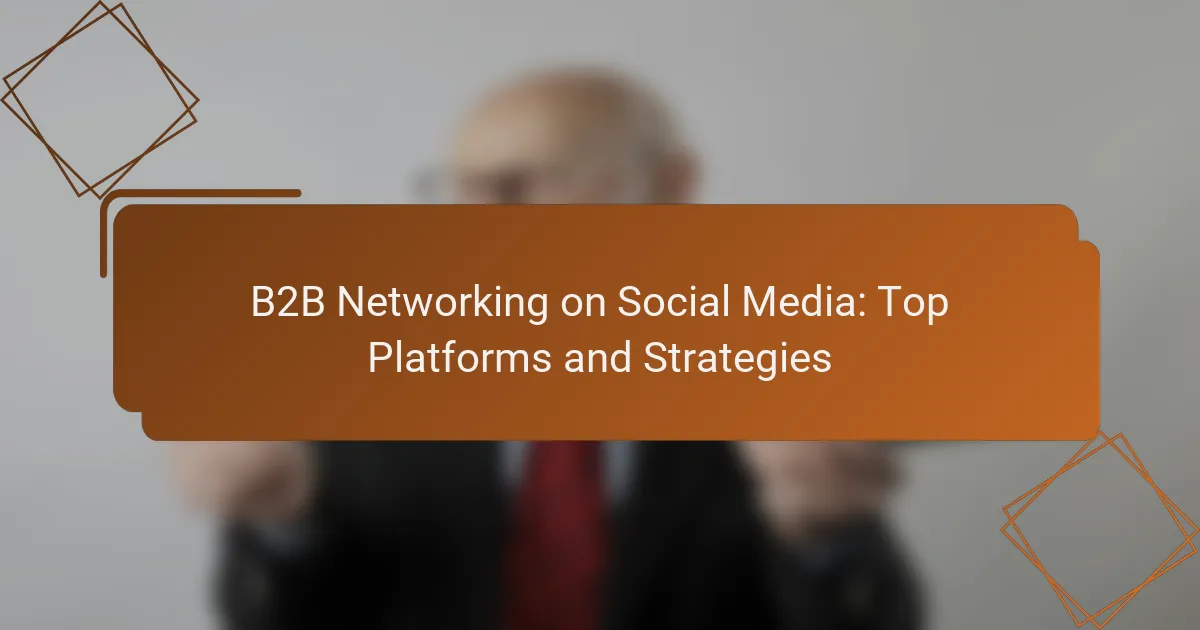B2B networking on social media is a powerful way to connect with potential partners and clients, with platforms like LinkedIn, Twitter, and Facebook offering unique opportunities for engagement. To maximize success, businesses should employ strategic content creation, personal branding, and targeted advertising while actively participating in relevant events. Optimizing your profile to reflect professionalism and expertise is crucial for enhancing visibility and credibility in the competitive landscape of B2B networking.
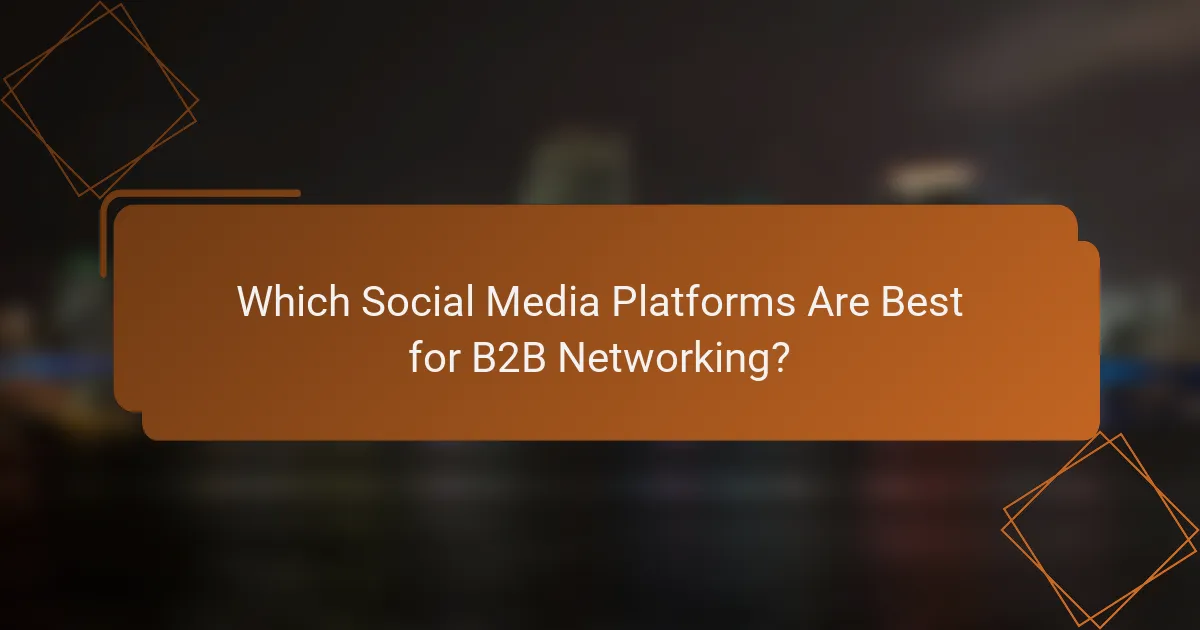
Which Social Media Platforms Are Best for B2B Networking?
The best social media platforms for B2B networking include LinkedIn, Twitter, Facebook, Instagram, and Reddit. Each platform offers unique features that cater to different aspects of professional engagement, making it essential to choose the right one based on your networking goals.
LinkedIn for Professional Connections
LinkedIn is the premier platform for B2B networking, designed specifically for professionals to connect and collaborate. It allows users to create detailed profiles showcasing their skills, experience, and endorsements, which can attract potential business partners or clients.
To maximize your presence on LinkedIn, engage with industry-specific groups, share valuable content, and connect with peers. Regularly updating your profile and participating in discussions can significantly enhance your visibility and credibility.
Twitter for Industry Insights
Twitter serves as a real-time platform for sharing industry news and insights, making it ideal for B2B networking. Businesses can follow thought leaders, engage in conversations, and utilize hashtags to join relevant discussions.
To effectively use Twitter, tweet regularly, retweet valuable content, and participate in Twitter chats related to your industry. This approach helps build relationships and keeps you informed about trends and opportunities.
Facebook for Community Building
Facebook is valuable for creating and nurturing communities around specific industries or interests. Through groups and pages, businesses can foster discussions, share resources, and build a loyal following.
When using Facebook for B2B networking, focus on creating engaging content that encourages interaction. Regularly post updates, ask questions, and respond to comments to strengthen community ties and enhance your brand’s presence.
Instagram for Brand Storytelling
Instagram is an effective platform for B2B companies looking to showcase their brand visually. Through images and videos, businesses can tell their stories, highlight products, and share behind-the-scenes content that resonates with their audience.
To leverage Instagram for networking, maintain a consistent aesthetic and post regularly. Use stories and reels to engage followers, and consider collaborating with influencers or industry partners to expand your reach.
Reddit for Niche Discussions
Reddit is a platform for niche discussions, where businesses can engage with specific communities relevant to their industry. Subreddits allow for targeted conversations, feedback, and sharing expertise with a highly engaged audience.
To effectively use Reddit for B2B networking, participate authentically in discussions, avoid overt self-promotion, and provide valuable insights. This approach builds trust and positions your brand as a knowledgeable resource within the community.
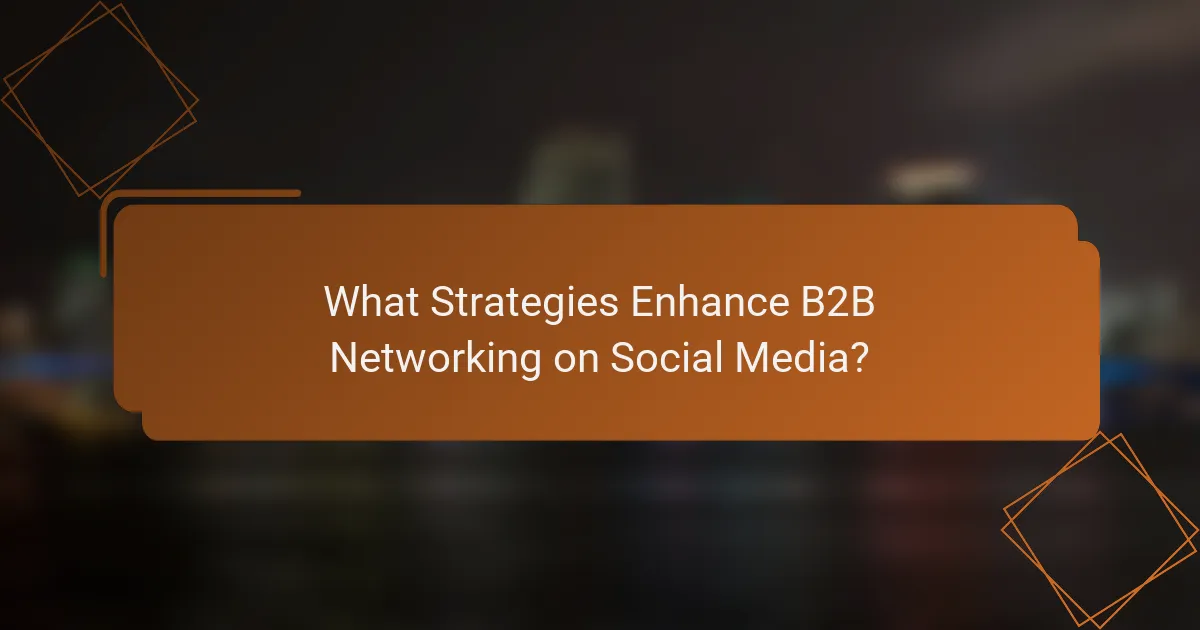
What Strategies Enhance B2B Networking on Social Media?
Effective B2B networking on social media requires a combination of strategic content creation, personal branding, targeted advertising, and active participation in networking events. These strategies help businesses build connections, establish authority, and generate leads.
Content Marketing for Engagement
Content marketing is essential for engaging your audience on social media. By sharing valuable insights, industry news, and thought leadership articles, businesses can attract and retain the attention of potential clients. Aim to post consistently, using a mix of formats such as articles, infographics, and videos to cater to different preferences.
Consider creating a content calendar to plan your posts and ensure a balanced mix of promotional and informative content. Engaging with your audience through comments and shares can further enhance visibility and foster relationships.
Personal Branding for Authority
Building a strong personal brand on social media establishes authority in your industry. Share your expertise through regular posts, participate in discussions, and showcase your achievements. This not only enhances your credibility but also encourages others to connect with you.
Utilize platforms like LinkedIn to highlight your professional journey and share relevant content. Consistency in your messaging and visual branding across platforms reinforces your identity and makes you more recognizable to potential partners and clients.
Targeted Advertising for Lead Generation
Targeted advertising on social media can significantly boost lead generation efforts. Platforms like LinkedIn and Facebook offer advanced targeting options that allow you to reach specific demographics, industries, and job titles. This precision increases the likelihood of connecting with potential clients who are genuinely interested in your offerings.
Set clear objectives for your ads, whether it’s driving traffic to your website or promoting a specific service. Monitor performance metrics to refine your approach and optimize your ad spend for better results.
Networking Events for Relationship Building
Participating in networking events, both online and offline, is crucial for building meaningful relationships. These events provide opportunities to connect with industry peers, potential clients, and partners. Look for webinars, conferences, and local meetups relevant to your field.
When attending events, come prepared with a clear pitch and business cards. Follow up with new contacts after the event to maintain the connection and explore potential collaborations. Engaging in ongoing conversations can lead to fruitful partnerships and referrals.
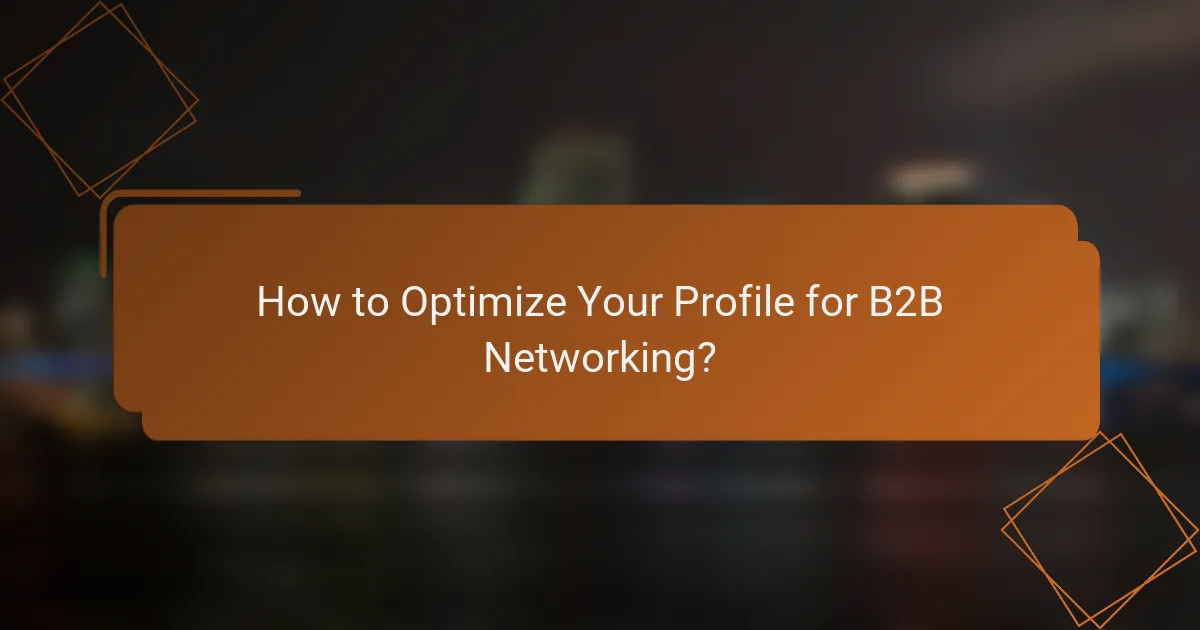
How to Optimize Your Profile for B2B Networking?
To optimize your profile for B2B networking, focus on presenting a professional image, clear communication of your expertise, and showcasing relevant skills. A well-optimized profile enhances your visibility and credibility, making it easier to connect with potential business partners.
Professional Headshot for First Impressions
Your profile picture is often the first impression you make in B2B networking. Use a high-quality, professional headshot that reflects your industry standards. Aim for a clean background and dress appropriately for your field.
Consider using a friendly expression to convey approachability. Profiles with professional headshots receive significantly more engagement, so investing in a good photo is worthwhile.
Compelling Bio for Clarity
Your bio should clearly articulate who you are and what you do. Start with your current role and key responsibilities, followed by a brief overview of your professional background. Use concise language to maintain clarity.
Incorporate keywords relevant to your industry to improve searchability. Aim for a length of around 150-200 words to keep it engaging without overwhelming readers.
Showcasing Skills for Credibility
Highlighting your skills is crucial for establishing credibility in B2B networking. List your core competencies prominently on your profile, focusing on those most relevant to your target audience. Consider using bullet points for clarity.
Endorsements from colleagues can enhance your profile’s credibility. Actively seek recommendations and endorsements to validate your skills, as profiles with these features tend to attract more connections.

What Metrics Should You Track for B2B Networking Success?
To achieve success in B2B networking, it’s essential to track key metrics that reflect your engagement and growth. Focus on metrics like engagement rate, connection growth, and lead conversion rate to assess the effectiveness of your networking strategies.
Engagement Rate for Content Effectiveness
Engagement rate measures how actively your audience interacts with your content, including likes, shares, comments, and clicks. A higher engagement rate indicates that your content resonates well with your target audience, which is crucial for building relationships in B2B networking.
To calculate engagement rate, divide the total interactions by the total reach or impressions, then multiply by 100 to get a percentage. Aim for engagement rates in the low to mid double digits for optimal effectiveness. Regularly analyze which types of content generate the most engagement to refine your strategy.
Connection Growth for Network Expansion
Connection growth tracks the increase in your professional network over time, reflecting your ability to build relationships. This metric is vital for expanding your reach and influence in the B2B space.
Monitor your connection growth monthly to identify trends. A steady increase of 5-10% per month is a good benchmark. Focus on sending personalized connection requests and engaging with new contacts to foster meaningful relationships that contribute to your network’s growth.
Lead Conversion Rate for ROI
The lead conversion rate measures the percentage of leads that turn into customers, indicating the effectiveness of your networking efforts in generating business. A higher conversion rate signifies that your networking activities are yielding tangible results.
To calculate this rate, divide the number of converted leads by the total number of leads generated, then multiply by 100. A conversion rate of 10-20% is often considered effective in B2B contexts. Enhance your conversion rate by nurturing leads through personalized follow-ups and providing valuable content that addresses their specific needs.

How to Choose the Right Platform for Your Business?
Choosing the right social media platform for B2B networking involves understanding where your target audience engages and what features best meet your business objectives. Consider the demographics, industry focus, and specific functionalities of each platform to make an informed decision.
Identify Target Audience for Platform Selection
Start by defining your target audience’s characteristics, such as industry, job roles, and interests. Platforms like LinkedIn are ideal for reaching professionals, while Twitter may attract a broader audience interested in real-time updates.
Conduct surveys or analyze existing customer data to pinpoint where your audience spends their time online. This will help you prioritize platforms that align with your networking goals and improve engagement.
Assess Platform Features for Business Needs
Evaluate the features of each platform to ensure they support your business needs. For example, LinkedIn offers advanced targeting options and professional groups, while Facebook provides robust advertising tools and community-building features.
Consider aspects such as analytics, content sharing capabilities, and integration with other tools. A platform that allows for easy content management and tracking can significantly enhance your networking efforts.
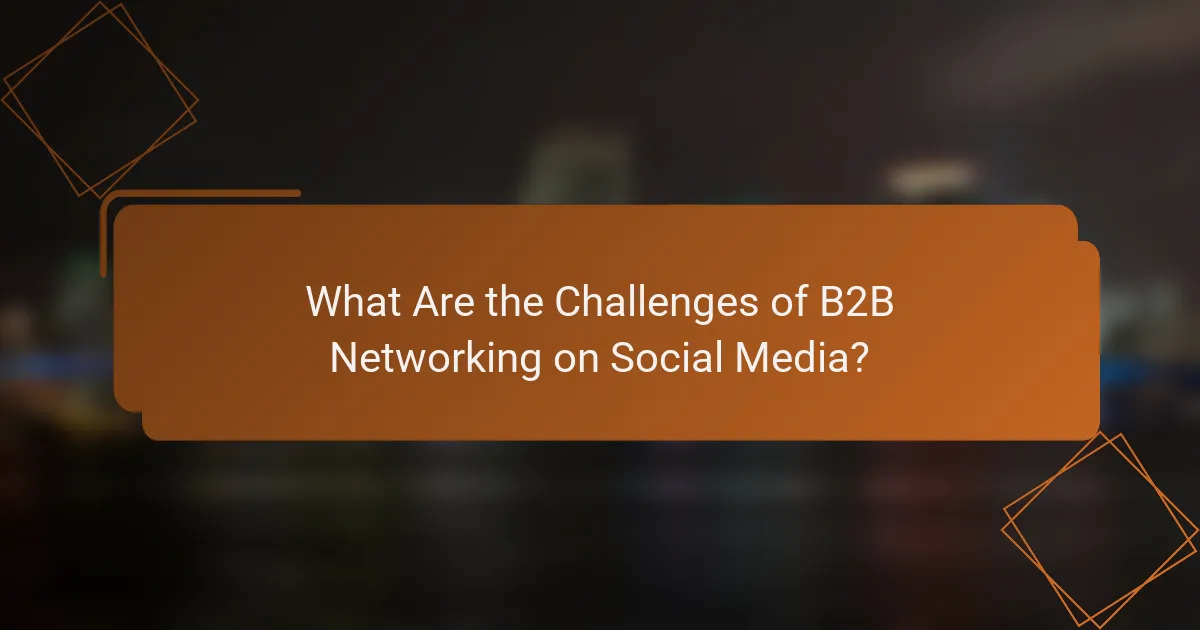
What Are the Challenges of B2B Networking on Social Media?
B2B networking on social media presents several challenges, including establishing trust, navigating diverse platforms, and managing time effectively. Companies must adapt their messaging to suit different audiences while ensuring consistent engagement across channels.
Building Trust and Credibility
Establishing trust and credibility is crucial in B2B networking. Businesses often face skepticism from potential partners or clients who may be wary of online interactions. To overcome this, companies should share valuable content, showcase customer testimonials, and engage authentically with their audience.
Consistent branding and a professional online presence can enhance credibility. Regularly updating profiles and participating in industry discussions can help build a trustworthy image over time.
Navigating Different Platforms
Each social media platform has its unique audience and features, making it essential to tailor strategies accordingly. LinkedIn is often favored for B2B networking due to its professional focus, while Twitter can be useful for real-time engagement and updates.
Understanding the nuances of each platform can improve networking efforts. For instance, using LinkedIn Groups for discussions or Twitter hashtags for visibility can enhance outreach and connection opportunities.
Time Management and Resource Allocation
Effective time management is a significant challenge in B2B networking on social media. Companies must allocate resources wisely to maintain an active presence without overwhelming their teams. Setting clear goals and prioritizing platforms can streamline efforts.
Utilizing scheduling tools can help manage posts and interactions efficiently. Regularly reviewing analytics can also inform adjustments to strategies, ensuring that time spent on networking yields positive results.
